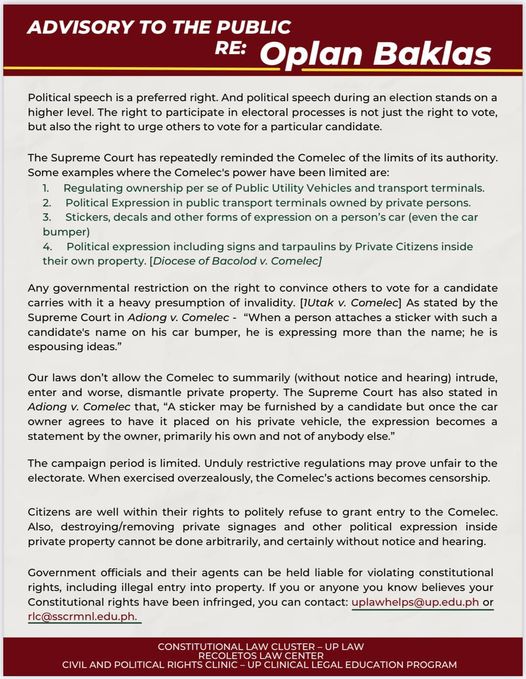LEGAL DISINFORMATION? Is it okay for Comelec to go around tearing down tarps on private property? After all, the Supreme Court has already ruled several times limiting Comelec’s reach in these matters.
Rating: PARTLY FALSE
This advisory serves as an aide in the protection of your precious tarpaulins and your more precious right to freedom of speech.
ADVISORY TO THE PUBLIC RE: OPLAN BAKLAS
Political speech is a preferred right. And political speech during an election stands on a higher level. The right to participate in electoral processes is not just the right to vote, but also the right to urge others to vote for a particular candidate.
The Supreme Court has repeatedly reminded the Comelec of the limits of its authority. Some examples where the Comelec’s power have been limited are:
1. Regulating ownership per se of Public Utility Vehicles and transport terminals.
2. Political Expression in public transport terminals owned by private persons.
3. Stickers, decals and other forms of expression on a person’s car (even the car bumper)
4. Political expression including signs and tarpaulins by Private Citizens inside their own property. [Diocese of Bacolod v. Comelec]
Any governmental restriction on the right to convince others to vote for a candidate carries with it a heavy presumption of invalidity. [1Utak v. Comelec] As stated by the Supreme Court in Adiong v. Comelec – “When a person attaches a sticker with such a candidate’s name on his car bumper, he is expressing more than the name; he is espousing ideas.”
Our laws don’t allow the Comelec to summarily (without notice and hearing) intrude, enter and worse, dismantle private property. The Supreme Court has also stated in Adiong v. Comelec that, “A sticker may be furnished by a candidate but once the car owner agrees to have it placed on his private vehicle, the expression becomes a statement by the owner, primarily his own and not of anybody else.”
The campaign period is limited. Unduly restrictive regulations may prove unfair to the electorate. When exercised overzealously, the Comelec’s actions becomes censorship.
Citizens are well within their rights to politely refuse to grant entry to the Comelec. Also, destroying/removing private signages and other political expression inside private property cannot be done arbitrarily, and certainly without notice and hearing.
Government officials and their agents can be held liable for violating constitutional rights, including illegal entry into property. If you or anyone you know believes your Constitutional rights have been infringed, you can contact: uplawhelps@up.edu.ph or rlc@sscrmnl.edu.ph.
CONSTITUTIONAL LAW CLUSTER
RECOLETOS LAW CENTER
CIVIL AND POLITICAL RIGHTS CLINIC – UP CLINICAL LEGAL EDUCATION PROGRAM
February 16, 2022










